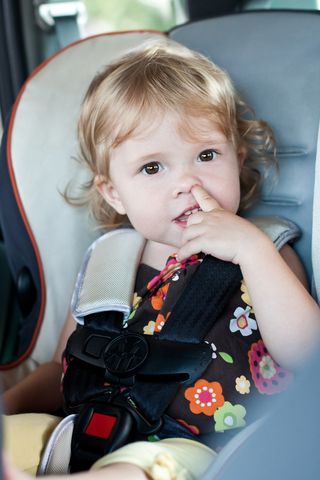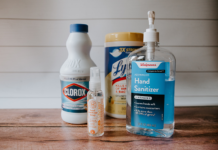by Dr. Craig A. Maxwell
A study conducted by Queen Mary University showed that an average of 700 different kinds of bacteria lurk within the interior of your car. In comparison, the average public toilet harbors only 60! If you and your family seem to continually pass colds, flu, and stomach bugs around or if you just can’t seem to get your allergies under control, the germs in your car could be to blame.
You don’t just use your car to get around. You eat, wipe your nose, bite your fingernails, sneeze, and cough during your long commutes to work or on your favorite Sunday drives. If you have children, you’ve probably joked on more than one occasion that there could be something alive in the backseat and you wouldn’t even know it.
There is something alive. Germs and mold. And since you’ll spend an average of 4 years of your life behind the wheel, you should know what to do to protect yourself from the onslaught.
Aspergillus Mold Allergy Worsened by Your Car
According to a study conducted by The Healthy House Institute[1. http://loveyourcarandtruck.com/wp-content/uploads/2013/09/germs-in-cars.pdf], aspergillus mold is the most common type of mold found lurking in your vehicle. This can spell trouble for someone with mold sensitivity.
A condition called Allergic Bronchopulmonary Aspergillosis (ABPA) can affect those with asthma and cystic fibrosis. This occurs when the body has a hyper-allergic immune response to the mold species, aspergillus. Symptoms include wheezing, shortness of breath, low-grade fever, and a cough with bloody mucus or brownish flecks.
Even if you aren’t prone to this more serious condition, mold allergies can be exacerbated when it’s allowed to grow unchecked in dark corners of your vehicle.
Married Moms Tend to Have the Most Bacteria in Their Car
The Healthy House Institute also revealed that single men had the least amount of bacteria in their cars, while married women with children appear to have the most. This is certainly not a surprising finding as most mothers will attest to having quite a rough time keeping their cars clean between sticky fingers and meals on the run.
Germ Hot-Spots to Focus on During Your Next Car Cleaning
1. Dashboard
Your dashboard can be a veritable petri dish of germs because it is often the warmest spot in your car at any time of year. Your car’s ventilation system also draws all the bacteria in your car to this location. This means any cold or stomach bug germs you or your passengers have been harboring will end up hanging out on the dashboard for a few days.
Not only are your hands always on the steering wheel, it’s easy to cough and sneeze on it when you’re not feeling well. Colds and flu germs as well as more serious, antibiotic-resistant bacteria such as MRSA, has been found on automobile steering wheels.
3. Radio Dial
Many radio dials are made of plastic and have small grooves where bacteria can easily hide. Each time anyone in your car pops a zit or scratches their nose and changes the radio station, they’re generously sharing germs with you and everyone else who uses your car.
4. Door Handle
Door handles in your car can contain about as many germs as the ones in your home, if not more. Think of all the things your hands touch before and after you touch your door handles; (not to mention what ends up on the hands of your children).
5. Change Receptacle
The change receptacle in your car is often rife with germs because for one, money is dirty, and two, the natural bowl shape of the receptacle makes the perfect collection plate for food and drink spills, (which can breed some pretty nasty mold).
6. Window Opener
Whether crank or automatic, your window opener gets a lot of use by a lot of hands and could use a little extra attention the next time you clean your car.
7. Seats
You may not touch your car seats very often but they certainly get plenty of use. The spaces between your seats should be vacuumed out carefully as well, as that’s where food crumbs and those lost wads of gum tend to hide.
8. Child Car Seats
Child car seats are some pretty downright germy places what with leaking diapers and milk-encrusted cereal squishing between the cracks. Wash it out carefully at least once a month to cut down on the spread of disease-causing bacteria.
9. Seat Belt
Your seat belt is often a hotbed for staphylococcus aureus, a gram-positive coccus bacterium that has been linked with atopic dermatitis, cellulitis, pneumonia, meningitis, and sepsis. If you’ve ever gotten a rash from your seat belt, this bacterium could be the culprit.
10. Between the Seats
Remember that hair clip you lost a few months ago? It’s probably stuffed somewhere between your car seats wrapped up in some hair and dust, stuff alongside a small hunk of moldy bread. (Yuck). Clean between those seats carefully as they love to harbor all sorts of interesting things!
Clean Your Car the Safe, Natural Way
Despite the fact there is so much bacteria in your car, I highly advise against using harsh chemical products to clean it, especially ones containing Triclosan. Triclosan is a synthetic antibacterial agent that has been linked to the development of antibiotic-resistant disease.
Instead, use a combination of warm water, white vinegar, and castile soap to clean the interior of your car. Vinegar kills 99 percent of bacteria, and 82 percent of mold in your vehicle. The castile soap can cut down on the smell of the vinegar while polishing your surfaces to a shine.
Boost Your Immune System to Avoid Chronic Disease
If you frequently succumb to colds and flu or are living with any type of autoimmune condition such as diabetes, celiac disease, or psoriasis, it’s a good idea to boost your immune system to avoid those stubborn colds and flu.
For my patients, I recommend adding two important supplements:
- Diamond Nutritional’s Vitamin D3 5,000 IUs
Vitamin D3 deficiency is the most common vitamin deficiency in the United States. This is largely due to a combination of poor dietary habits, compromised digestion, and lack of natural sunlight. I recommend each of my patients with compromised immunity to boost their vitamin D3 levels naturally with a high-quality vitamin D3 supplement.

- Diamond Nutritional’s Probiotic Formula
It is estimated that 80% of your immune system resides in your gut. In order to successfully protect you from disease, your gut needs a healthy dose of live, active cultures called probiotics. Probiotics crowd out bad bacteria, improve your digestion, and keep you safe from both acute and chronic disease. I recommend patients with compromised immunity and digestion take a daily dose of high-quality probiotics each day for best results.

I recommend cleaning your car once every 2-3 months, perhaps more often if you have children. Get plenty of rest, eat a whole-food diet, and take supplements to fill in those inevitable nutritional gaps. Over time, you’ll find that any chronic conditions that used to plague you have become a thing of the past.
Your Car Isn’t the Only Germ Hot-Spot You’re Sitting In
Read More:










This reminds me, I need to go clean out my car!